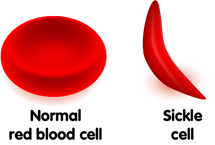Sickle Cell Awareness Month is devoted to raising awareness of sickle cell and acknowledging the achievements of those individuals living with sickle cell.
What is Sickle Cell?
Sickle Cell Disorders (SCD) are a group of illnesses that affect your red blood cells. Sickle cell is a hereditary condition, which means you are born with it, and it occurs when a child receives two sickle cell genes—one from each parent; you cannot catch it from other people.
People with SCD produce unusually shaped red blood cells that can cause problems the cells become hard and sticky and look like a C-shaped farm tool called a “sickle”.
It causes your normally round and flexible blood cells to become stiff and sickle-shaped, stopping the blood cells, and the oxygen they carry, from being able to move freely around the body and causing pain. This can cause the blood vessels to block as wells as trigger episodes of severe pain. These painful episodes are referred to as sickle cell crises. They are treated with intense painkillers such as morphine to control the pain.

Did you know
- SCD is inherited from both parents; sickle cell trait is inherited from one parent.
- SCD can affect anyone, although it mainly affects people from African and Caribbean backgrounds.
- Approximately 1 in 79 babies born in the UK carry sickle cell traits.
- Approximately 15,000 people in the UK have sickle cell disorder.
- Almost 300 babies are born in the UK with sickle cell each year.
- A simple blood test will tell whether you have sickle cell trait or the disorder.
- Children with SCD are at increased risk for stroke, the risk is highest between the ages of 2 and 16.
- Episodes of pain may occur in sickle cell disorder and are generally referred to as a crisis.
Is there a cure??
The only possible cure for the disorder is bone marrow or stem cell transplant but this is only possible for a limited number of affected individuals who have an appropriate donor (like a sibling). A medicine called Hydroxyurea can significantly reduce the number of painful crises.
How do people get sickle cell?
You inherit 1 set from your mother and 1 set from your father. To be born with sickle cell disease, a child must inherit a copy of the sickle cell gene from both their parents. This usually happens when both parents are “carriers” of the sickle cell gene, also known as having the sickle cell trait.
The trait is not an illness, but if you are planning to have children, then certain factors must be considered.
If your partner does not have sickle cell trait, then any children you have will not have sickle cell disorder, but they could have the trait (50% chance).
If you and your partner both have the trait, there is a 25% chance that any child conceived may have sickle cell disorder and 50% chance they will have the trait.
Look at the image below to get a better understanding of how sickle cell is inherited.

Sickle Cell Awareness Month is a month dedicated to raising awareness of sickle cell and celebrating the achievements of those living with sickle cell.
As part of our Corporate Social Responsibility strategy, we at @OutsourcedACC are delighted to add our In aid campaign for Great Ormond Street Hospital Children’s Charity.
Children are very close to our hearts, and we want to make a difference by organising a walk to support Great Ormond Street Hospital Children’s Charity.
For more details on how to join our walk and donate please click the link below👇👇
https://www.justgiving.com/fundraising/outsourcedacc
–
To read more about lifestyle & wellbeing click here
Written by Veronika Kot
